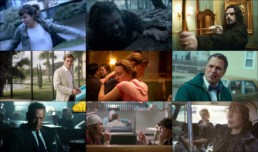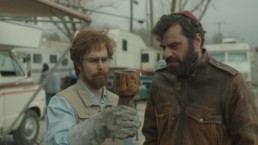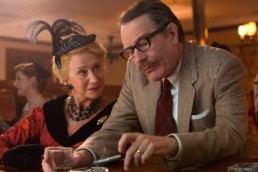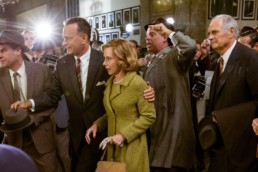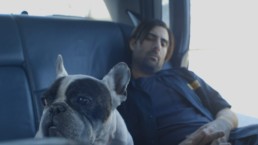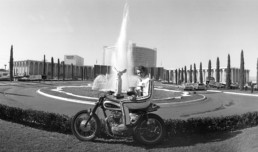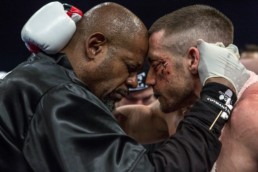'Hyena Road': War Drama Told From the Canadian Military
It is easy to forget that the war in Afghanistan is a global mess.
For that reason, Hyena Road is a refreshing look at the war because it tells the story from the perspective of the Canadian military, which leaves out the much of the American sentiments that most Hollywood productions portray.
Hyena Road is the most recent film to tackle the ever-complicated military tangle in the Middle East. The film itself takes place in Kandahar, Afghanistan, at one of the largest bases in the country. Following a series of soldiers in the Canadian military, including a senior officer, on the hunt for an elusive elder in an Afghan village who may or may not be an ally, a sniper finds himself caught in a dilemma about following orders or following the moral high ground among others.
Comparisons to The Hurt Locker, Zero Dark Thirty, and American Sniper are inevitable in its empathetic, near-journalistic focus on those fighting the war rather than the fights that make up a war. Most of the performances reflect this time, diluting the rough and rugged war movie stereotypes for a set of sincere, though rather bland, characters. The veteran intelligence officer is almost too good of a guy to be in a war movie, lacking a hard-nosed bravado that seems almost necessary for the situation. Perhaps even more pedestrian is a half-cooked romantic subplot that is awkwardly stretched through the film.
While there may be a bit too much humility in the characters, the directorial approach to the subject matter is rewarded by it. The lack of heroic proclamations about soldiers overseas is refreshing, especially the choice to often focus on civilian Afghans as allies, not outsiders. This choice is especially applaudable in a time when many American war films have disappointed in their one-dimensional portrayal of local Middle Eastern civilians. Thus, the intentions of Hyena Road are quite admirable and worthy.
Also of note are some of the action sequences. Especially compelling is the opening scene, which sees the snipers deciphering numerous roadblocks - both literal and metaphorical - in the uneasy silence of the Afghan hills. The majority though are shot with the energy of shaky cam's post-Bourne heyday. The scenes can be messy, but also visceral. In fact, this brings an interesting parallel would be Paul Greengrass’ Green Zone - a movie that strived to be a thinking man’s version of a "Call of Duty" film. While Hyena Road is a much more complicated character piece, unfortunately, it cannot rise above the uneven narrative that throws the film’s urgency off just enough to lose momentum all too often.
Hyena Road is now playing in theaters and VOD.
Jasper's Top 10 Films of 2015
What we consider to be the best of this year represents a combination of the movies that had the greatest emotional impact on us, matched with movies that felt innovative or groundbreaking. Here are the films Jasper considers to be this year’s best:

10. Inside Out (d. Pete Doctor)
It could be argued that Inside Out is the best educational movie ever made. It takes the very abstract scientific concept of the human brain and turns it into characters that everybody from ages 2 to 102 can not only understand, but relate to. As complicated as a doctoral dissertation and as fun as a Saturday morning cartoon, Inside Out is a return-to-form for heralded Pixar Animation. Never before has a Pixar film, or perhaps even an animated film, felt so vibrant and surreal. It’s a Technicolor therapy session and an existential adventure film, but it keeps itself impossibly grounded with raw human emotion. Well, that is an unfair advantage for a film about raw human emotion.

9. Brooklyn (d. John Crowley)
The real wonder of Brooklyn is in its simplicity. On paper, it’s a standard love story. Girl moves away. Girl meets guy. Girl falls in love with guy. Girl marries guy. The story goes on becoming a charming fable that asks important questions about home and adulthood, evolving into one of the sweetest and most honest period dramas in, perhaps, a decade. Much of this can be attributed to the two leads Saoirse Ronan and Emory Cohen. Ronan is magnetic and Cohen makes you melt. Their chemistry is, in the best way possible, a little awkward, but oh so endearing - a genuine snapshot of courtship in the 1950s. Their love story is so beautifully photographed with a rich palette of pastels that feels like that oil painting over your grandparents dining table - slightly corny, but wonderfully nostalgic.

8. Bridge of Spies (d. Steven Spielberg)
2015 was quietly a banner year for the spy movie. From reliable blockbuster fare (Mission: Impossible and Spectre) to smart reinventions (Kingsmen and Spy), the genre almost outdid superheroes for box office ubiquity. Bridge of Spies was the spy movie for adults. Perhaps Steven Spielberg’s quietest film in a decade, Bridge of Spies flourishes on an unlikely pairing. With a screenplay from Joel and Ethan Coen, it’s a spy film light on action and heavy on wit and political chatter. Spielberg’s hallmark sense of drama thrives on the Coen’s deadpan conversational tension, which is, in turn, bolstered by a brilliant cast headlined by Tom Hanks and Mark Rylance. It may be rather traditionalist, but it’s refreshing - a taut, political thriller, from a crew of storytelling masters, that would make Frank Capra proud.

7. What We Do in the Shadows (d. Taika Waititi)
For the most part of the last decade, vampires have been defined by Edward Cullen’s brooding angst – morphing this generation’s perspective of the mythic race into something more romantic than fearful. Despite their mysterious sensuality, vampires are pretty fucking goofy though. What We Do in the Shadows exploits this notion to its fullest capacity. Jemaine Clement (coming off a hat trick of a year) and Taika Waititi’s mockumentary romp about the daily go-abouts of a troupe of vampires in New Zealand is a bonkers roast of the undead. The result is the smartest vampire movie since Let the Right One In, perhaps the best farce since Borat and the funniest movie of the year.

6. The End of the Tour (d. James Ponsoldt)
It is not important to know much about David Foster Wallace before The End of the Tour because he feels like an old friend after about 106 minutes. This could be attributed to a lot of elements. Jason Segal disappears into Wallace in an awards-worthy role. Or perhaps it’s Donald Margulies’ wonderful script. Either way the tree shakes, it comes down to the words, the conversations. Whether it be about dogs, television, or Alanis Morissette, everything spoken in The End of the Tour feels like a revelation. Okay maybe, that is a bit much. But in the moment it genuinely does. It’s warm and inviting, existential and melancholic. It’s a movie where nothing particularly happens, but everything rings true. Not because it's a road trip with the supposed ‘voice of the generation,’ but because it is wholly honest.

5. The Revenant (d. Alejandro González Iñárritu)
Among the very many brutal moments in Alejandro González Iñárritu’s mammoth The Revenant, there are few beautiful moments where human breath literally fogs up the screen. Leonardo DiCaprio, in what should be his first Oscar-winning performance, almost disappears behind the cloud of his own breath. It is these moments that prove The Revenant may be the most intimate film of the year. Alongside the great cinematographer Emmanuel Lubezki, Iñárritu exerts ferocious realism and visual lyricism to craft an immersive, unrelenting portrait of human endurance that stands among greats such as Lawrence of Arabia and Apocalypse Now as a testament to the spirit of filmmaking on the edges of the world.

4. 99 Homes (d. Ramin Bahrani)
The 2008 financial crisis was a very confusing time in America. For specifics on what went down, buy a ticket for Adam McKay’s rousing The Big Short, a high school economics teacher’s dream movie (where you at, Mr. Browning?!) which somehow makes learning about flawed consumerism fun and informative. To really understand the effects of the debacle, 99 Homes is the master class. Bolstered by muscular performances from Andrew Garfield and Michael Shannon, it’s a white-knuckle thrill ride and a piercing character study of American greed. Discerning as a documentary and sensational as a soap opera, 99 Homes is both essential and entertaining insight into the crisis’ effects on American life.

3. Victoria (d. Sebastian Schipper)
It’s better to know up front that Victoria is all shot in one take. Sure, call it a gimmick or a stunt to fill up seats, but that would be ignorant. In fact, it is a marvel. It is only a marvel though because the story and the characters are as equally compelling as the stunt itself. The chemistry feels so organic and uncalculated that you wonder whether director Sebastian Schipper and cinematographer Sturla Brandth Grøvlen just up and decided to follow some twentysomethings in Berlin and watch their night unfold. For that reason, it’s better to not know much else about the Victoria. The concept and the narrative work hand in hand to form a singular cinematic experience that is a refreshing rush of pure adrenaline.

2. Infinitely Polar Bear (d. Maya Forbes)
Talk about the greatest actors of the generation for a moment. Seriously, take a second. It’s a crime that Mark Ruffalo probably only came up because he’s pictured above. In his (Bruce) banner year, his centerpiece performance in Infinitely Polar Bear is the key evidence that he is the most sensitive and versatile actor working. His is a manic showcase and, ironically, for a comedy about bipolar disorder, it is remarkably balanced debut feature for director Maya Forbes that tackles mental health, race and parental roles with rare and necessary authenticity.

1. Grandma (d. Paul Weitz)
Grandma is easily the simplest film on this list. In fact, you could make 83 different Grandma’s with Robert Downey Jr.’s Avengers salary (and I guarantee the world would spin a little smoother). But, what on paper could read as a simple road comedy crackles to life in a way that few films did this year. Sweet, acerbic, and riotously funny, director Paul Weitz has crafted a small, timely and topical triumph with his script. But it is a revelatory Lily Tomlin as the titular matriarch who leads a small, but mighty ensemble on a slight, but brave day trip through the emotional truths of love, aging and learning to move forward.
Honorable Mentions
A list of some other wonderful films to add to the end-of-year festivities
Another wonderful portrait of fatherhood to play alongside Infinitely Polar Bear is James C. Strouse’s People, Places, Things. As previously mentioned, Adam McKay’s The Big Short is a rollicking and rather informative tale of the financial crisis.
Tom McCarthy’s Spotlight illuminated the inner-working of the newspaper business to deft effect.
Brett Morgan’s intimate rock documentary Cobain: Montage of Heck and Bill Pohlad’s complex Brian Wilson biopic Love & Mercy (with impressive dual leads from Paul Dano and John Cusack as, respectively, young and old Wilson) redefined what the music film can be.
The American war on drugs was enlightened with a trio of perspectives in Denis Villeneuve’s narrative thriller Sicario, and two separate documentaries told from separate sides of the border: Matthew Heineman’s immersive Cartel Land on the southern cartels and Bill and Turner Ross’ cinema verité Western from a small town Texan side.
Another impressive documentary about small town America worthy of mention was Michael Beach Nichols and Christopher K. Walker’s harrowing tale of white supremacy in the midwest Welcome to Leith. Speaking of the west (the wild west), Quentin Tarantino’s The Hateful Eight was a rollicking addition to his impressive canon.
Netflix made an impressive first foray into the feature game with Cari Joji Fukunaga’s Beasts of No Nation. The most impressive foreign language film aside from Victoria was Miroslav Slaboshpitsky’s gritty, sign language coming-of-age drama The Tribe.
And, of course, there was the stop-motion genius of Mark Burton and Richard Starzak’s Shaun the Sheep Movie, the latest and zaniest feature from the creative team behind Wallace and Gromit.
Review: 'Don Verdean'
Film has really become the quintessential American art form - arguably our greatest and most influential export to the international market. However, the list of great filmmakers with a sharp eye on the American cultural landscape is slowly shrinking. The Coen Brothers, Paul Thomas Anderson, Alexander Payne, to name some of the greats, have made a career out of plucking stories from the forgotten corners of the Fargos, Nebraskas and the Little Bostons of American lore. To much less acclaim, the Hess family - a rare husband-and-wife writing duo - have quietly been writing stories about the bizarre pockets of this country that make it so fascinating. Their first and most successful feature, Napoleon Dynamite, became a generation-defining dose of suburban Idaho teenage hilarity a short decade ago. They crossed the southern border for their follow-up, the even quirkier Luchador fable Nacho Libre, and the small-town fantasy book farce Gentleman Broncos. Their latest film, Don Verdean, may be their most American film yet.
Don Verdean follows the eponymous archeologist (Sam Rockwell), a has-been, public-access type star who found minor success uncovering ancient Biblical relics. Now, Verdean is forever driving town to town selling books and DVDs of his findings out of his shoddy RV. After a small-town pastor (Danny McBride) agrees to fund a series of expeditions for artifacts such as Goliath’s skull to bring back the congregation he has lost to a new, rival church down the road, Verdean and his motley team begin to get themselves into some controversy.
If there is anything the Hess’ do best, it is creating an American that is stuck in the purgatory of past and present.
The concept of Don Verdean is brilliant. It is wacky in the typical Hessian sense, balancing smart satire and low-brow comedy. The movie never plays out as clever as its concept, unfortunately. As with most of the Hess’ previous films, it is more quirky than it is funny. It lacks a real across-the-board comic inertia to get anywhere significant. It loses a lot of steam in the latter half when the attention is turned away from Verdean’s expeditions abroad and the story putters out in a very weak third act love triangle that loses most sight of what makes the concept so fun in the first place.
Contrary to much of his career, Sam Rockwell is never particularly charismatic in the title role. He, unfortunately, does not have too much to play with that supports his typical manic energy, but luckily his supporting cast gets a little more to play with and carry the weight. Amy Ryan is sweet as ever as Verdean’s research assistant and Danny McBride is perfectly cast as pastor Tony Lazarus. It is Jemaine Clement, though - who has been tiptoeing through a wonderful year following standout performances in What We Do In Shadows and People, Places, Things - who gets the belly of the few audible laughs as Verdean’s Israeli guide, Boaz.
On the flip side, what makes the film rather admirable is its wonderful sense of the folly of religion. The Hess’ refrain from ever-too-obvious jabs and take a more absurd lens to an increasingly absurd institution. Hats off to Hess’ visual sense in creating a world that feels rather odd, though never too far off in time and place. If there is anything the Hess’ do best, it is creating an American that is stuck in the purgatory of past and present. In only that very visual sense, Don Verdean could rival Napoleon Dynamite as perhaps the Hess’ best film. If only it had any laughs to make it timeless.
Don Verdean opens at Laemmle theaters and on VOD this Friday.
https://www.youtube.com/watch?v=7Kf1WAcs6gs
Review: 'Trumbo'
The Commies are having a moment in Hollywood. On the heels of the fantastic Bridge of Spies Cold War drama comes Trumbo - an earnest, if not clunky biopic about blacklisted Hollywood screenwriter Dalton Trumbo. It may seem odd that such a foreign concept to many young Americans was a contentious ideological struggle, however, it is one that mirrors a lot of gender and racial politics in the film industry today. Trumbo, the film, almost plays too close to a standard awards-season biopic, though Trumbo, the subject, is an important, if not complicated, figure, that Hollywood can stand to, again, learn from.
The film follows the height of legendary, Academy Award-winning screenwriter Dalton Trumbo’s career. To say ‘height’ of his career may prove oxymoronic. Trumbo and the rest of the Hollywood Ten’s tenure on the Hollywood Blacklist for their Communist ideologies put any communist sympathizers out of work in the business. Soon, Trumbo and his comrades find a route to work writing hundreds of screenplays under pseudonyms for studios tremendous and trashy. He would even win two Academy Awards during this time period under different writer’s credits for Roman Holiday and The Brave One only to be limited to watching the ceremonies from his couch, next to his wife and three children. Soon, Trumbo begins to fight back against the Communist prejudice and work his way back into Hollywood.
Trumbo, the film, almost plays too close to a standard awards-season biopic, though Trumbo, the subject, is an important, if not complicated, figure, that Hollywood can stand to learn from again.
Trumbo is easily director Jay Roach’s “best” film in the most academic sense of the word. It is not nearly as memorable as his decade-defining Meet the Parents and Austin Powers trilogies -- if that is really an appropriate word -- though it is his most refined and carefully crafted. This is in large part due to the very gifted ensemble he has rounded up. Bryan Cranston, for better or for worse, chews up the scenery as Dalton Trumbo in a larger-than-life performance befitting of Trumbo’s towering personality. The performance is quite hammy next to Diane Lane’s subdued portrayal of his wife Cleo or Louis CK’s earnest, though awkward, portrayal of the fictitious Arlen Hird - a character compendium of many of Trumbo’s comrades. Cranston disappears into the role though, leaving us with a better sense of the very complicated man behind the typewriter. Look for reliable standout supporting turns from the always great Michael Stuhlbarg, Helen Mirren, and John Goodman as well.
Despite John McNamara’s quick-witted script, the film slogs along for a picture that clocks in at a bit beyond two hours. The beginning takes off with the light feet of the most harmless made-for-TV movies and the brains of an Oscar player though the pace slows by a significant amount during Trumbo’s blacklisted years. While this is truly the most affecting portion of the film - it becomes rather repetitious, not unlike Trumbo’s career during that time. The history lessons and moral lectures do become a bit cumbersome and things get a bit clunky in the final act, but Trumbo is really too charming of a film to get down on. Sharp, funny and very clean in its craft, it’s classic Hollywood done right - something that Mr. Trumbo himself would be quite pleased with.
https://www.youtube.com/watch?v=af4Ua6DUpzg
Review: 'Bridge of Spies'
Look closely at that skinny credit font on the Bridge of Spies poster, and there, quietly, lay a legendary tag team listed without ceremony. No, not Tom Hanks and Steven Spielberg together for their umpteenth collaboration. It’s Joel and Ethan Coen, the demigods of independent cinema who seem to be making a quiet career out of touching up studio Oscar bait. Last year, their writing touch was far from apparent in the lukewarm and manipulative war drama Unbroken, which they were listed as primary writers. It was a movie that made it apparent that their signature dry wit did not translate to big-budget awards-season drama. Bridge of Spies would, in theory, be an even bigger display a dissonance: the Stony Coens vs. the Spectacle of Spielberg. However, it works better than ever.
Their film - and I say ‘their’ because each provide equal narrative heft - follows the true story of James Donovan (good ole reliable Tom Hanks), a Brooklyn lawyer chosen to represent accused Soviet spy Rudolf Abel (a brilliant Mark Rylance) at the peak of Cold War paranoia in the late '50s. After softening Abel’s sentence, the government nominates Donovan to quietly negotiate the exchange of American pilot Francis Powers for Abel in Berlin after Powers is shot down over Soviet borders.
'Bridge of Spies' thrives on the deadpan conversational tension that has made some of the Coen Brothers best work shine.
To begin, the film may be Spielberg’s quietest film in a decade or so. Like his previous film, the triumphant Lincoln, it’s very light on action and heavy on political chatter. Where Lincoln was interested in bold statements and speeches, Bridge of Spies thrives on the deadpan conversational tension that has made some of the Coen Brothers best work shine. It’s the dry humor that is all-too-often missing from Spielberg’s filmography. And despite his tendency to do as such, he does very little to manipulate the dramatics as he has done so recently. Of course, this is aside from a particularly annoying musical cue during Abel’s shining scene in the film, one of those sequences that the Academy Awards will screen during Rylance’s surefire and well-deserved nomination.
It’s the back and forth between Hanks and Rylance that really sets the tone for the film. Hanks is the joy and Rylance is the melancholy to this Capra-esque thriller. Each knows when to be quiet in place of the other’s voice - a testament to their reigns of the greatest actors of American cinema and British theater. While the film is a touch long, it is a masterclass in political tension and one of the best Cold War films in recent release, if not ever. This, of course, is a testament to the collaboration of Spielberg’s sense of drama and the Coen’s sense of wit. Really, the film is a tribute to this collaboration - like the governments it portrays. Two very opposite sets of filmmakers making a modern near-masterpiece.
Bridge of Spies is now playing everywhere.
https://www.youtube.com/watch?v=2-2x3r1m2I4
Review: '7 Chinese Brothers'
Who knew that the drummer of sublimely underrated indie rockers Phantom Planet would become one of the coolest kids in film? If you look at his lineage, it may have been obvious (he is a Coppola kid, after all), but Jason Schwartzman has steadily risen from Rushmore to become one of the great enigmas working on screen today. He’s that kid you knew in high school who you let copy your test in calculus because you thought he could get you into Friday’s party or that wet blanket townie who snuck into an art school party that could talk about one or two Tom Waits albums before he excused himself to bum a smoke from every other person in the room. He’s brash, sharp and simultaneously everything you love and hate. Perhaps this is sounding a bit too much like Schwartzman now - quite bizarre, slightly obnoxious, almost pretentious and a lot like his new film 7 Chinese Brothers.
7 Chinese Brothers, the latest film from veteran Austin filmmaker Bob Byington, follows the misadventures of Larry (Jason Schwartzman), an apathetic prankster in between employment at Buca di Beppo and a local oil lube place. He balances his social time between his French bulldog Arrow (Schwartmen’s own dog Arrow), his elderly grandmother (Olympia Dukakis) and his best friend Major Norwood (TV on the Radio frontman Tunde Adebimpe). Though he finds himself enjoying his new job, he struggles to find love and meaning in life through his cynical life lenses.
Who knew that the drummer of sublimely underrated indie rockers Phantom Planet would become one of the coolest kids in film?
It’s a slacker comedy that nods to fellow Texan filmmakers Wes Anderson and Richard Linklater - a character study of an amiable prick more interested in delivering absurd humor than social normalities. Larry is never particularly funny when he speaks - not much of his dialogue makes much sense to begin with - though he is undeniably charming and it’s easy to run with his - or rather Byington’s - oddball humor. Unfortunately for Larry and the audience, it doesn’t get the character of the movie anywhere. Schwartzman has his moments, though what 7 Chinese Brothers lacks is any real sympathy for Larry - the character feels like a caged zoo animal watching everybody else is his life wander elsewhere.
For this reason, it is rather hard to sit with the film. It’s brisk and light on its feet. There are few great supporting characters (Alex Ross Perry makes a great cameo as “Hats at Cars” - a man whom scolds Larry for, you guessed it, throwing a hat at his car). However, it’s far too formless as a narrative and even as a simple, low-budget character study, it feels all too unmotivated. Not unlike that kid in high school calculus class. 7 Chinese Brothers is quite cool, though in the end, it isn’t going to actually get you anywhere.
But at least it has some good taste in music…..
7 Chinese Brothers opens this Friday at Sundance Sunset Cinemas.
https://www.youtube.com/watch?v=K-jPsO_eT1g
Review: 'Being Evel'
The legend of Evel Knievel is one that is told every day in these modern times. At the dawn of this wee millennium, his spirit rose like a phoenix through the booming action sports mania that continues to pulse through today. It found itself in the belly of the early days of reality television as, back in the 70s, Knievel was its first superstar. A particular gang of boneheads somehow got a television deal, named their show Jackass and made millions in the same way that Knievel did: putting their bodies in danger for, not ego and fame like Knievel, but for the sake of laughs and loony, teenage fun.

This past week, the Jackass team was in attendance for the premiere of the documentary Being Evel, not as fans, but as film-makers honoring the late motorcycle daredevil. Producing under their Dickhouse production banner with Academy-Award winning director Daniel Junge - whose last feature documentary, Beyond the Brick: A LEGO Brickumentary, saw release only a month ago - in the director’s seat, Being Evel is a rather heartfelt tribute for clan of such doofuses.
Angry and complicated, he is an outlaw - a true American cowboy and perhaps one of the last.
The subject of the film speaks for himself. For those who grew up glued to Kneivel’s stunts on ABC’s Wide World of Sports, his unflinching rockstar ego comes alive again, full force through career-spanning archival footage. He is a rich documentary subject. Angry and complicated, he is an outlaw - a true American cowboy and perhaps one of the last. Junge allows the most honest portrait of Knievel by not holding back; the jumps, the missed landings, the scuffles with the press - it’s all there. The film is a museum piece to the daredevil.

The interviewees both legitimize what is already on screen, and also provide a fascinating depth to the man. To begin, there is a very impressive spectrum of personalities who give their Knievel tales from miners in his hometown of Butte, Montana, to his close family, to the modern action sports celebrities who have given a legacy to his stunts. While the movie theater location of the interviews is rather hokey and some of the dialogue sounds curiously pre-written - see Knoxville’s awkward, though wildly passionate and knowledgeable interview that runs throughout the film - this lineup adds an incredible narrative to the piece.
Being Evel does feel particularly long despite its average 100 minute runtime and rapid pacing. Perhaps this is because of the saturation of interview subjects that weave in so quick, you forget their relation to the man. Or perhaps it is the nature of a documentary that is so comprehensive of its subject from beginning to end. Whatever reason, it is baffling that a narrative feature has not yet been filmed about Evel Knievel, a man that Being Evel nearly resurrects to reveal one of the more bizarre and fascinating personalities of the 20th century.
Being Evel is now playing at Sundance Cinemas West Hollywood.
https://www.youtube.com/watch?v=3MFAQ368E3s
Review: 'Southpaw'
Jake Gyllenhaal’s resurgence as a bankable, “serious” Hollywood actor only speaks to the long list of films he has starred in to date. His current string of stunning performances dating back to 2011’s Source Code and leading up to last year’s snubbed Nightcrawler has been dazzling. The kid from Donnie Darko has actually grown into a pretty daring actor. He’s always been one though. In 2001, he flipped from the demented Bubble Boy to the seedy surrealism of Donnie Darko, 2005 saw him play his, at that point, brawniest role as a Gulf War soldier in the underrated Jarhead and then gather an Oscar nomination for his most tender and vulnerable role as a gay cowboy in Brokeback Mountain. Gyllenhaal has been a chameleon his entire career. With Southpaw, he is proving it louder than ever.
Southpaw follows the trials and tribulations of Billy “The Great” Hope (Gyllenhaal), the light heavyweight boxing champion of the world. Coming up through the system, Hope has risen to superstardom and great wealth alongside his wife Maureen (an impressive performance Rachel McAdams) and his daughter Leila (Oona Laurence). After his wife is tragically shot at a charity event, Hope falls into a pit of despair and poverty. When Leila is taken into child services, Hope turns his life around to get back into the ring and fight - literally and metaphorically - for his family and the good of himself.
If anything, the film is a triumph for its performances and a victory for Fuqua proving he can capably direct more than popcorn action.
The film is an impressive turn from director Antoine Fuqua, himself in a commercial renaissance following the back-to-back action success of Olympus Has Fallen and The Equalizer. Southpaw is a strong return to his dramatic peak over a decade ago with Training Day. The direction here is confident, though also vulnerable, something that Fuqua seemed to lack during the energetic masculinity and action ferocity of his preceding filmography. Not to undermine the aggressiveness in Southpaw, however, as it’s possibly the most brutal boxing film in more than a decade.
The boxing sequences themselves are, appropriately, the most visceral moments of the film. Gyllenhaal is a brute force in the ring eating up the scenes and spitting them out, bloodied. His punch-drunk performance is a spectacle, though unfortunately despite Gyllenhaal “The Great” Hope’s best efforts, he cannot lift the dramatic moments out of all too familiar territory. Southpaw is no Million Dollar Baby or The Fighter.
Fuqua’s directorial hand falls far too hard especially in the film’s former half. TV veteran Kurt Sutter’s screenplay is manipulative and inconsistent, to boot. A great performance by Forest Whitaker as Hope’s trainer in the latter acts adds a much-needed humanity that hoists the film up into the later rounds.
If anything, the film is a triumph for its performances and a victory for Fuqua proving he can capably direct more than popcorn action. Through all of the film’s dramatic tribulations, Southpaw is impossible not to root for.
Southpaw opens nationwide this Friday.
https://www.youtube.com/watch?v=D68vmev7KZc


